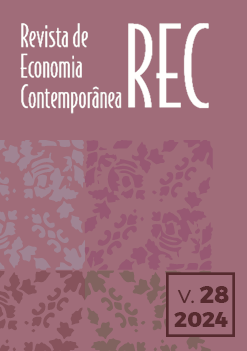Formação de competências como desafio à inovação no Brasil: uma análise comparativa regional para o período 2012-2019
Skill development as a challenge to innovation in Brazil: a regional comparative analysis for the period 2012-2019
Palavras-chave:
Fragmentação do processo de aprendizado. Intensidade tecnológica. Nível educacional. Macrorregiões brasileiras.Resumo
Este artigo se propõe a analisar a desarticulação entre a oferta e a demanda por conhecimento nas regiões brasileiras, utilizando como proxy a oferta de mão de obra e a sua inserção nos setores produtivos de acordo com a classificação de intensidade tecnológica da Organização para Cooperação e Desenvolvimento Econômico. São utilizados os dados da Pesquisa Nacional por Amostra de Domicílios Contínua do Instituto Brasileiro de Geografia e Estatística para o período de 2012 a 2019, e são estimados modelos logit multinomial para dados empilhados para o período com o objetivo de mensurar diferenças nas probabilidades de absorção dos trabalhadores ocupados em setores de baixa, média e alta intensidade tecnológica. Os resultados indicam que avanços no grau de qualificação formal reduzem a probabilidade de absorção em setores de baixa intensidade tecnológica, ao mesmo tempo em que aumentam as chances de inserção em setores de média e alta intensidades tecnológicas. As disparidades regionais evidenciam que a concepção de uma política que tenha como objetivo o fomento da inovação requer o desenho de instrumentos que estimulem de forma concreta o aumento da demanda por conhecimento.
Downloads
Downloads
Publicado
Edição
Seção
Licença
Copyright (c) 2024 Naira Teresa A. C. Gonçalves , Márcia Siqueira Rapini , Mariangela Furlan Antigo

Este trabalho está licenciado sob uma licença Creative Commons Attribution 4.0 International License.
Todo el contenido se publica bajo una licencia Creative Commons CC-BY, salvo que se indique lo contrario.


